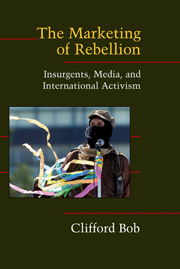Book contents
- Frontmatter
- Contents
- Maps and Tables
- Acknowledgments
- The Marketing of Rebellion
- 1 INSURGENT GROUPS AND THE QUEST FOR OVERSEAS SUPPORT
- 2 POWER, EXCHANGE, AND MARKETING
- 3 FROM ETHNIC TO ENVIRONMENTAL CONFLICT: NIGERIA'S OGONI MOVEMENT
- 4 THE MAKING OF AN ANTIGLOBALIZATION ICON: MEXICO'S ZAPATISTA UPRISING
- 5 TRANSNATIONAL MARKETING AND WORLD POLITICS
- APPENDIX 1 NGO STANDARDS FOR SUPPORTING LOCAL MOVEMENTS
- APPENDIX 2 INTERVIEWS
- Bibliography
- Index
- References
Bibliography
Published online by Cambridge University Press: 24 May 2010
- Frontmatter
- Contents
- Maps and Tables
- Acknowledgments
- The Marketing of Rebellion
- 1 INSURGENT GROUPS AND THE QUEST FOR OVERSEAS SUPPORT
- 2 POWER, EXCHANGE, AND MARKETING
- 3 FROM ETHNIC TO ENVIRONMENTAL CONFLICT: NIGERIA'S OGONI MOVEMENT
- 4 THE MAKING OF AN ANTIGLOBALIZATION ICON: MEXICO'S ZAPATISTA UPRISING
- 5 TRANSNATIONAL MARKETING AND WORLD POLITICS
- APPENDIX 1 NGO STANDARDS FOR SUPPORTING LOCAL MOVEMENTS
- APPENDIX 2 INTERVIEWS
- Bibliography
- Index
- References
- Type
- Chapter
- Information
- The Marketing of RebellionInsurgents, Media, and International Activism, pp. 207 - 226Publisher: Cambridge University PressPrint publication year: 2005



